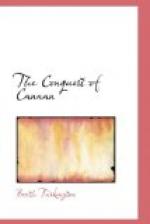“It is not believed by many that his intention was burglary, though what his designs were can only be left to conjecture, as he is far beyond the age when boys perform such actions out of a sense of mischief. He had evidently occupied his hiding-place some time, and an idea of his coolness may be obtained from his having procured and eaten a full meal through an unknown source. Judge Pike is justly incensed, and swears that he will prosecute him on this and other charges as soon as he can be found. Much sympathy is felt for the culprit’s family, who feel his shame most keenly, but who, though sorrowing over the occurrence, declare that they have put up with his derelictions long enough, and will do nothing to step between him and the Judge’s righteous indignation.”
The Pike Mansion, “scene of festivity, music, and mirth” (not quite so unalloyed, after all, the stricken Flitcroft keeping his room for a week under medical supervision), had not been the only bower of the dance in Canaan that evening: another Temple of Terpsichore had shone forth with lights, though of these there were not quite a myriad. The festivities they illumined obtained no mention in the paper, nor did they who trod the measures in this second temple exhibit any sense of injury because of the Tocsin’s omission. Nay, they were of that class, shy without being bashful, exclusive yet not proud, which shuns publicity with a single-heartedness almost unique in our republic, courting observation neither in the prosecution of their professions nor in the pursuit of happiness.
Not quite a mile above the northernmost of the factories on the water-front, there projected into the river, near the end of the crescent bend above the town, a long pier, relic of steamboat days, rotting now, and many years fallen from its maritime uses. About midway of its length stood a huge, crazy shed, long ago utilized as a freight storeroom. This had been patched and propped, and a dangerous-looking veranda attached to it, over-hanging the water. Above the doorway was placed a sign whereon might be read the words, “Beaver Beach, Mike’s Place.” The shore end of the pier was so ruinous that passage was offered by a single row of planks, which presented an appearance so temporary, as well as insecure, that one might have guessed their office to be something in the nature of a drawbridge. From these a narrow path ran through a marsh, left by the receding river, to a country road of desolate appearance. Here there was a rough enclosure, or corral, with some tumble-down sheds which afforded shelter, on the night of Joseph Louden’s disgrace, for a number of shaggy teams attached to those decrepit and musty vehicles known picturesquely and accurately as Night-Hawks. The presence of such questionable shapes in the corral indicated that the dance was on at Beaver Beach, Mike’s Place, as surely as the short line of cabs and family carriages on upper Main Street made it known that gayety was the order of the night at the Pike Mansion. But among other differences was this, that at the hour when the guests of the latter were leaving, those seeking the hospitalities of Beaver Beach had just begun to arrive.




